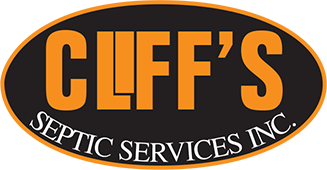A Septic System is a highly efficient biological system which can effectively digest and disperse your household sewage and other organic wastes.
Removal of solids. As sewage enters the septic tank, its rate of flow is reduced so that the larger solids sink to the bottom of the tank. These solids are retained in the tank and the clarified effluent with suspended and dissolved solids is discharged.
Bacterial action. The solids and the liquids in the tank are partially decomposed by bacteria and other natural processes. These bacteria are called anaerobic because they thrive in the absence of free oxygen. This decomposition of sewage under the anaerobic conditions is termed ‘septic’ , hence the name of the system (and the cause of the odor).
Sludge and scum storage. Sludge is the accumulation of solids at the bottom of the tank, while scum is a partially submerged material of floating solids that may form at or near the surface. Space must be provided in the tank to store these residues during the intervals between cleaning. Otherwise, the sludge and scum will eventually be scoured from the tank and will clog the leach field and receiving soil. Periodic cleaning of your tank is essential to its proper function.
New Construction
When building a new home or facility, you will need a septic system installed if you do not have a connection to your city or county sewer system. In some cases, a sewer may be available, and you may still choose to install septic.
State laws determine where a septic system can be placed. The current rules are:
• 75 feet from private potable wells
• 50 feet away from any non-potable wells
• 10 feet away from any storm sewer pipe
• 5 feet away from any buildings or property lines
• 75 feet away from any surface water bodies
Additionally, Florida law requires that if an on-site sewage system processes more than 2,000 gallons per day, then it must be at least 200 feet away from any public drinking well. Less than 2,000 gallons per day, then it must be at least 100 feet away from any public drinking well. (University of Florida: 2021 Handbook of Florida Water Regulation: Onsite Sewage Treatment and Disposal Systems)
Cliff’s technicians can advise on the best placement for your installation.
Existing System Repair
Things that sometimes go wrong and what we do to fix these.
Pumping
Must be done on a regular basis to ensure smooth operation of the system. This also allows our professionals to have a look at the system and notice small problems before they become big ones.
Items that should never go down the drain or flushed away
Regardless of packaging claims, many items marketed as “flushable” are not. This includes baby and personal cleansing wipes and tampons. This is a rather exhaustive list of the many things that should never enter your septic system.
- Paper towels
- Feminine hygiene products (pads and tampons)
- Diapers
- Condoms
- Grease and oil used for cooking or cars. Even light oils that remain liquid.
- Coffee grounds
- Bleach
- Paint or paint thinner. Any solvent such as gasoline, kerosene.
- Kitty litter
- Cigarette butts
- Dental floss
- Plastics
- Industrial and household chemicals, bleach, bug spray and lawn chemicals
- Q-tips, ear plugs
Regular pumping of a septic tank will extend the life of your wastewater system and protect your drain field. The State of Florida recommends your tank be pumped every 2 to 3 years. Tank size, water consumption, garbage disposal and products used in the home can greatly influence how often it should be done. It is also a good idea to have your tank pumped just before a large gathering of people.
Minimize or eliminate use of sink ‘disposal’ units which grind up food wastes and place a burden of your septic tank.
Don’t stack firewood or place storage sheds or other structures over your system.
Don’t use colored toilet paper, it does not break down in the tank as rapidly as white paper.
Spread out laundry washing throughout the week, versus doing it all in one day. This could overload the system. A good rule of thumb is doing 2 – 3 loads per day.
Check for the following symptoms:
Septic surfacing in yard
Strong or bad odors
Slow flushing
Gurgling
Over flow at washing machine hookup, shower or toilet.
Need supplemental facilities for your event or construction project?
Cliff’s also offers a full-service chemical portable toilet service, renting and leasing portable chemical toilet units to customers requiring facilities on a wide variety of applications such as construction sites for residential, commercial and industrial projects.
Cliff’s portable toilets offers services to any and all civic, church, private and community events such as large crowd gatherings, picnics, weddings, concerts and other activities which attract large crowds or groups of people. These facilities can be rented for a variety of projects and functions either weekly, monthly, or even weekend only requirements. Rentals and contracts can be tailored specifically to a customer’s particular needs and requirements.
